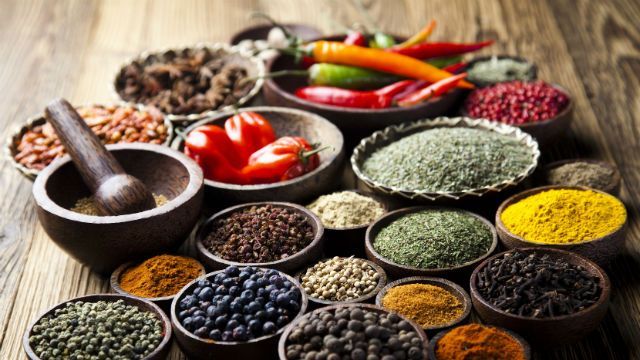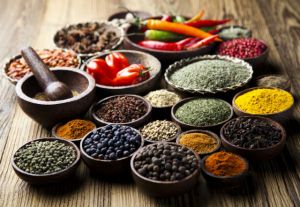
Herbs and spices can make a world of difference to help you achieve the combination of tasty and healthy cooking. Many rival and even surpass the nutritional value of potent antioxidant-filled fruits and veggies.
These tips can help ensure you’re making the most of all that herbs and spices can offer.
Use whole spices whenever possible
Purchasing your spices whole and grinding them as you need them produces the strongest, most aromatic flavors as exposure to air and sunlight will weaken them. There are some exceptions, such as cinnamon and coriander as they’re too hard to grind into a fine powder. You can use a coffee grinder to grind spices at home, but it should be dedicated just to spices and not used for your coffee beans. Of course, you can always use a mortar and pestle or just chop them up on a board with a good chef’s knife, provided they aren’t round spices.
Storing your herbs and spices
Keeping your herbs and spices fresh is essential from a nutritional and flavor standpoint. Purchase them in small quantities from a reliable source and store them away from heat and sunlight. Don’t store them in hard plastic containers as the material is too porous, glass containers will help keep them protected. Dark amber glass is preferable, but the most important thing is to keep them as far away from your stove as possible, ideally in a dark cabinet.
Freeze fresh herbs if you won’t be using them quickly
If you can’t use up all your fresh herbs before they go bad, you can chop them up and store them in the freezer. One easy way to do this is to freeze them in an ice cube tray. Once they are frozen the cubes can be removed and stored in a freezer-safe bag – then, all you’ll need to do is pull out just the amount you need the next time you cook.
Don’t be afraid to experiment
Have fun and get creative when using herbs and spices. Try using them in unfamiliar or nontraditional ways and see what fabulous creations you can come up with.
When to add them
Dried herbs and spices need time and moisture to rehydrate during cooking in order to release the flavors. Adding dried herbs at the start of cooking helps to rehydrate and release their flavor. Fresh herbs and spices are best added at the end for optimal flavoring.
Substituting dried herbs for fresh
If a recipe calls for fresh herbs and you only have dried, the general rule for substitution is 1:3, which means if it calls for one tablespoon (3 teaspoons) of fresh herbs, use one teaspoon of dried. As dried herbs have more concentrated flavors, you don’t need to use as much. Of course, you can always adjust according to your own preferences.
Using for disease prevention
 To take advantage of the nutritional benefits of herbs and spices, use a variety of different seasonings and use them as often as you can. Michelle Dudash, R.D., owner of Chef Dudash Nutrition, a nutritional coaching service, recommends allowing your herbs and spices to “take center stage.” For example, she says, you can use lots of parsley in tabouli, or feature a red chili sauce on poultry or pork.
To take advantage of the nutritional benefits of herbs and spices, use a variety of different seasonings and use them as often as you can. Michelle Dudash, R.D., owner of Chef Dudash Nutrition, a nutritional coaching service, recommends allowing your herbs and spices to “take center stage.” For example, she says, you can use lots of parsley in tabouli, or feature a red chili sauce on poultry or pork.
Making the most of garlic’s great benefits
You can get the most out of your garlic, including potent cancer fighting action, by chopping it up about 10 minutes before cooking. Chopping or crushing it helps to activate its natural disease-fighting compounds. Allowing your chopped or crushed garlic to sit for at least several minutes, ideally for 10 minutes, optimizes its fabulous health-promoting properties.
-The Alternative Daily
Sources:
http://afoodcentriclife.com/tips-for-using-dried-herbs-spices-and-a-giveaway-from-cooking-planit
http://www.thekitchn.com/john-beavers-5-essential-herb-spice-tips-for-home-cooksexpert-essentials-180633
http://cookingmatters.org/tips/10-tips-using-herbs-and-spices
http://familydoctormag.com/nutrition/1524-cooking-with-herbs-and-spices-health-benefits.html

